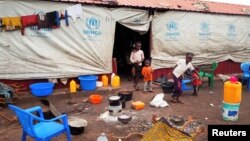The U.N. refugee agency says a voluntary repatriation program for Congolese refugees wishing to return home from Angola resumed after a two-year break due to the COVID-19 pandemic.
The UNHCR says a first convoy of 88 Congolese refugees left northern Angola and is due to arrive in the Democratic Republic of Congo Wednesday. The agency says they will stay in a transit center for the night before crossing the border into the DRC.
UNHCR spokesman Boris Cheshirkov said more than 600 other Congolese refugees, so far, have indicated they too want to go home. He said other convoys are scheduled to travel through the Chissanda border crossing in the coming weeks.
From there, he said, the refugees will head to various destinations in the western DRC, including Kasai, Kasai Central, and Kinshasa, the capital.
“Although conflict continues in eastern DRC, improvements in security in the West have re-opened the possibility for Congolese to return to their country in dignity and safety. Returning refugees have told UNHCR they were excited to restart their lives in their country after years in exile,” he said. “Many have not seen family since fleeing political and ethnic violence in DRC’s Kasai region in 2017.”
At that time, conflict and violence sent some 35,000 Congolese fleeing for their lives to Lunda Norte Province in Angola. Since then, thousands of refugees have spontaneously returned to their places of origin in response to reports of improved security.
Conditions in eastern DRC, on the other hand, remain extremely volatile. The United Nations says most of the 5.6 million people displaced by conflict and violence inside the country reside in the eastern provinces of North and South Kivu, Ituri and Tanganyika.
Cheshirkov said in recent weeks there has been a dramatic rise in the number of people killed and displaced due to attacks by armed groups in those areas.
“At the same time, in other parts of the country, we see that the security situation has improved,” he said. “And what is important is that UNHCR will always continue to advocate for the full support and essential services to be provided by the government, by the authorities to those that are going back, especially when it comes to security. So, they are able to rebuild their lives.”
Cheshirkov said the returnees receive a re-integration package upon their arrival in the DRC. That, he said, includes cash assistance to help pay their rent and cover basic needs such as personal hygiene and household items. He added that additional support is given in enrolling children in school and helping people gather crucial civil documentation essential for their re-integration process to begin.




